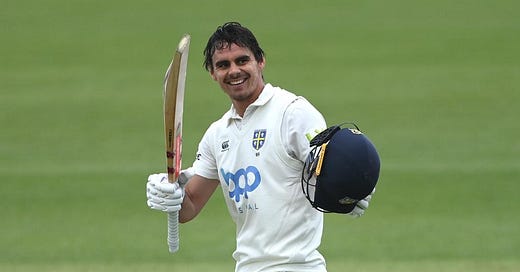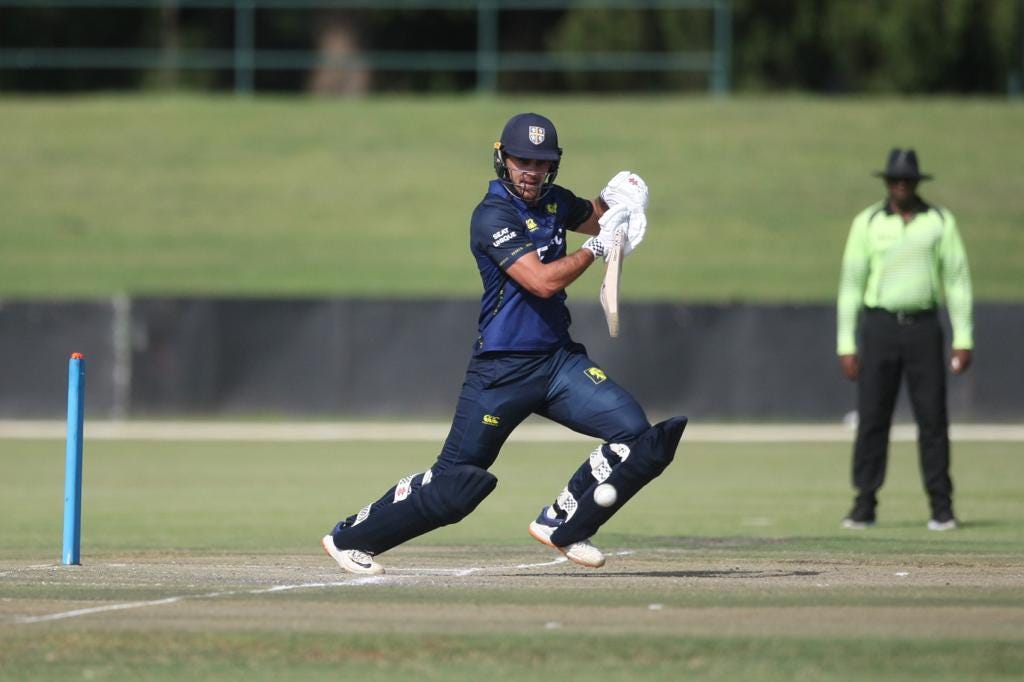David Bedingham spends six months in the UK, with Durham, and the other six months in South Africa with Western Province.
When David Bedingham showed up to indoor cricket, he was handed the number five shirt. From that day, he became the kid who always asked for the number five shirt. His name was synonymous with the number. Looking for a player with the number five shirt was an easy way to spot him. Another way would have been to look for the kid who sulked after being dismissed. Left to his own devices, Bedingham would sulk for an entire day.
He saw a dismissal as him being denied access to doing what he loved the most: batting. Given a chance, Bedingham loved batting so much that he could bat at night in the backyard.
“Right now, I am trying to get to a place where if I score 150 or if I score nought, I try and be exactly the same person. It’s difficult to reach that state, so after a dismissal, I allow myself a couple of minutes of sulking and then snap out of it and turn my attention to supporting the other guys,” says Bedingham.
Indoor cricket was the third stop after backyard cricket and Milnerton Cricket Club. David and his brother Bob found themselves playing indoor cricket and going on interprovincial tours in the winter because a coach suggested it to their parents.
John and Debbie Bedingham received pushback from other parents for taking their boys to the indoor circuit. It was not proper cricket and could hurt the boys’ technical development, the traditionalists said. That did not matter to the Bedinghams. They introduced backyard cricket to their home because they thought it was a good way to keep the boys occupied.
“Anyone that has two boys knows that you have to keep them busy, otherwise, things get pretty mischievous. Cricket was a good way to get them to burn off all that excess energy. It was a way to get them to rather focus on more positive things rather than fighting each other,” says John.
Backyard cricket provided the family with an extra avenue to hang out and be together. Indoor cricket added to that by providing opportunities for family outings. The atmosphere at the indoor cricket venues always had a great family vibe.
It just so happened that the boys fell in love with the game and wanted to play it all the time. Indoor cricket was another opportunity for them to play cricket in the winter. Someone bowled and someone batted, it was still cricket. So, the murmurings about how it could hurt the boys’ technique did not register with John and Debbie Bedingham. There were no expansive cricket dreams in the Bedingham household.
On the plus side for the now-professional David Bedingham, indoor cricket was also the place where he developed and grooved one of his favourite shots in the game, the back-foot drive through covers.
This newsletter is completely reader-supported. If you’re willing and able, please consider supporting it in one of two ways, leaving a tip or becoming a Patreon. Thank you so much for your time and investment!
5 January 2010. David had an opportunity to atone for running his brother out earlier in the year. The Bedingham boys did not get many opportunities to bat together at Wynberg Boy’s High, so they tried to make the best of every chance. Bob came in to bat after David. In his excitement, David misjudged a run and Rob was run out for a duck.
Watching David and Bob play together was a treat John and Debbie hardly enjoyed. Often, they were split in different directions. “They played for different teams, but we never let them go to on tour alone, my wife would go one tour and I would go on the other. But we always made sure that we that we gave them equal support and equal viewer time,” says John.
For John and Debbie, there was nothing better than watching their boys play in a game together. Some families bond over board games, the Bedinghams had cricket. To see David and Bob play together on the same team brought on emotions they rarely experienced when they watched them play individually.
The match against Outeniqua had another significance, David and Bob were both born in George. It was a homecoming of sorts. This time around, David did not run his brother out. The Bedingham boys batted what felt like a very long time to their excited parents as they salvaged the innings and set Wynberg up for victory.
While batting, David and Bob had a separate contest on their hands. While Bob played the role of the considerate older brother who provided support to his little brother, there was a competitive side to their sporting relationship. Unsupervised backyard contests often ended with some crying and shouting.
In his first season with Wynberg, David scored 96 runs in eight games. In that same period, Bob scored three centuries for his team. “Whenever we used to have our fights, he would go straight to that thing, ‘you suck, and I've done really, really well,’” David recalls.
Doing well for his team was the goal for David. Out-doing Bob was the icing on the cake. It wasn’t just because of the competitive nature of their relationship, “Bob was a lot more talented than me. But I just think he enjoyed, he enjoyed other things a bit more, rather than cricket,” says David.
Against Outeniqua, Bob beat David in their little contest. “I remember that match like it was yesterday. Bob was in the mood and batted really well, and he beat me to 50,” says David. The boys top-scored for Wynberg, Bob with 64 and David with an unbeaten 58. It remains one of David Bedingham’s favourite knocks.
His father shares the feeling, “It will always be special to me. They were both born in George started playing cricket out there. That will always be one of my favorites.”
David Bedingham had his green and gold number five shirt in his cricket bag when he scored his coming-of-age century. It wasn’t by design. Young David Bedingham was a little more than disorganized. Sometimes an item of clothing that was not supposed to be in his bag found itself there. At other times, an item that was supposed to be in there found itself left behind.
On match day, the odds were that someone had to rush or call home for an item of kit Bedingham had left behind. His parents were always scrambling to get things to him on time. One time, John drove David back to Wynberg at 9 pm to retrieve a pair of shoes David had left on the field.
Whether at home or in the dressing room, his kit often occupied the most space. John Bedingham laughs that it covered a five-meter radius. That has changed, though. Growing up and being married to a thoughtful woman has transformed him. The one thing that he rarely uses one will find in his bag these days is a pair of keeping gloves.
In 2016, Bedingham was involved in a serious car accident, and he broke the femur in his leg. Since then his movement hasn't been what it used to be in his youth when he kept wicket, captained and led the run-scorers list at Wynberg. “I think I still do a decent job when keeping, but to do it consistently for a long time, I think it would take a lot of strain on my leg. That's probably one of the reasons why I don't keep so much anymore,” says Bedingham.
Sunday the 3 February 2013, was one of the few times when a teenage David Bedingham did not need his parents to fetch a forgotten piece of kit from home.
When he arrived at the crease, South Africa Under-19 was struggling on 29 for four after 24.5 overs. They needed a win. The hosts were one-nil down in a two-match series. But, after an early routing at the hands of Olly Stone, it looked like the England Under-19 team had it in the bag.
It was also one of the few times when John Bedingham missed a match where one of his sons was involved. John had no cricketing background and outside of support, there was little else he could offer his sons.
“I think the fact that I didn't play cricket helped a lot because I could not give them any technical advice at all. I didn’t interfere with the coaches. I never used to get intense about it,” says John. “All I could offer was support and help if they wanted that.”
Before the match, father and son spoke on the phone and the older Bedingham wished the younger one luck. He knew how important this match was for the team. John was in Molteno, Eastern Cape, visiting one of the wind farms under his purview. “I remember it like it was yesterday. I was at the Eastern Cape airport when I started getting SMS and WhatsApp messages from everyone updating me on his score once he got in to bat.”
John Bedingham is a nervous watcher so he turned his phone off. He turned it back on after touching down in Cape Town and by then, Bedingham had passed the 100-run mark and South Africa was cruising to victory. “It was a very special day. We were immensely proud of him that day,” says John.
“I'm not gonna say I was earmarked, though I was always doing pretty well for Wynberg. That knock really put me out there,” says Bedingham.
When David Bedingham arrived at Chester-le Street, he asked if the number five shirt was available. In a sport with so many unpredictable elements, it helps to have something that makes you feel at home. The number five shirt does that for Bedingham. Three might be a charm for some, for David, it’s five that’s a charm.
On 5 December 2016, Bedingham was involved in a serious car accident. They had to cut him out of the wreckage. He could have lost his life. But, he was fortunate. That accident also marked the end of a chapter in his cricket career. Before the accident, Bedingham used to put himself under undue pressure to do well. After the accident, he adopted a new perspective. He was kinder to himself.
“I feel that's when my cricket turned around. My ‘comeback story’ started with the accident,” says Bedingham.
To get noticed by Durham, Bedingham had to do well for Cape Cobras. To join the Cobras, Bedingham scored five centuries in a three-month period for Boland. He signed with the Cobras in the fifth month of the year. Five is a charm for David Bedingham. “There's just something about the number that resonates well with cricket,” he says.
If you found this interesting, please share it:
You can support Stumped! by leaving a tip:
Thanks for reading. Until next time… - CS








